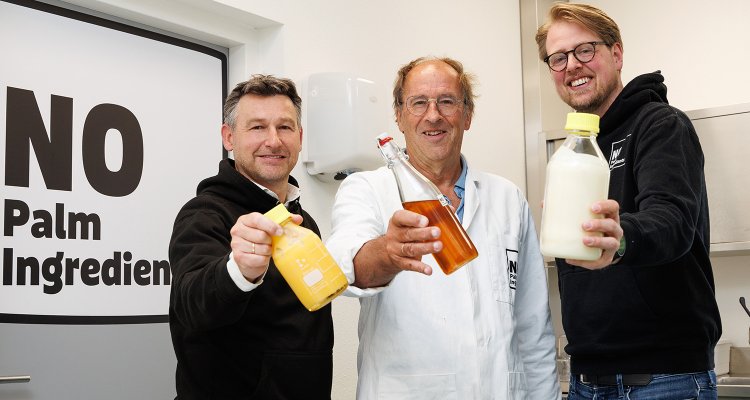
News
NoPalm Ingredients: equipment sharing offers opportunities for startups
The startup NoPalm Ingredients has invested in a series of modern bioreactors together with Wageningen University & Research (WUR). The investment was partly made possible with a grant for shared research facilities, made available by the RegioDeal Foodvalley. Entrepreneur and company founder Jeroen Hugenholtz and Martijn Bekker, project leader at Wageningen Food & Biobased Research, share their experiences with the shared use of this equipment.
Stop deforestation and reduce food waste. That is the starting point for NoPalm Ingredients. The startup produces sustainable oils and fats from residual streams that are almost identical to what is in palm oil. 'We use yeasts that convert vegetables, fruit and other residual streams into oil via fermentation,' Hugenholtz explains. 'The challenge is to grow these in such a way that they produce the maximum amount.'
Extra capacity
That breeding is done in large bioreactors, of which the company has one of its own. 'That gets us a long way,' says Hugenholtz. But there are also periods when we have too little capacity to meet demand, for instance when parts have to go to the supplier for maintenance. Then it is nice if we can use equipment that we can get to work quickly and easily. We know exactly how the bioreactors at Wageningen Food & Biobased Research work. And they are only a kilometre away from us.'
'We now have a total of eight bioreactors of different volumes in our laboratory,' Bekker says. 'We only use them ourselves half the time, which we think is a waste. A bioreactor easily costs fifty thousand euros each.'
Investing together
Recently, Wageningen Food & Biobased Research expanded its capacity: the research group invested in four bioreactors with a grant from the Regiodeal Foodvalley. NoPalm Ingredients is one of the co-investors. 'By jointly investing in bioreactors and sharing our research facilities, young companies can have high-quality advanced equipment; investment costs are shared and one can use the equipment at a favourable rate. This allows them to develop further,' Bekker said.
Sharing equipment intensifies mutual cooperation and knowledge exchange, Bekker notes. 'Companies are sometimes looking for knowledge that requires specific expertise, but do not want to start a large and expensive project. We then let them do the fermentations themselves and, as a 'knowledge expert, support them on the sidelines with our expertise and measuring equipment.'
Public-private cooperation
Sharing equipment often leads to further collaboration with and between parties. The one between Bekker and Hugenholtz resulted in the creation of the public-private collaboration Fermentation Visualised and Simplified (FEVIS). 'In it, we investigate how to monitor and adjust fermentation completely online. With the insights provided by our studies, we will soon be able to make processes even more efficient.'
These are great examples. Nevertheless, Bekker notices that researchers and entrepreneurs sometimes hesitate to share research equipment. His advice is: 'Set aside your reservations and just go for it. Make clear agreements about the collaboration and you will discover that together you come to surprising new insights.' The team of experts from Shared Research Facilities at WUR can support organisations in this.
Confidentiality
Agreements to be made are primarily about the use of equipment. But confidentiality is also a concern. Hugenholtz: 'As an entrepreneur, agree that you yourself are in the lead of the research and have the experiments carried out by your own people. Then you only need the equipment experts for support, and nothing else.' In this too, the Shared Research Facilities team provides support, with contracts stipulating the sharing of equipment.
Hugenholtz and his team can now dream the way to the bioreactors. 'Making use of the research infrastructure here in Wageningen makes us strong. Our investors are also aware of this. That alone is reason enough to share equipment through WUR's Shared Research Facilities platform.'
More on NoPalm Ingredients on their website
